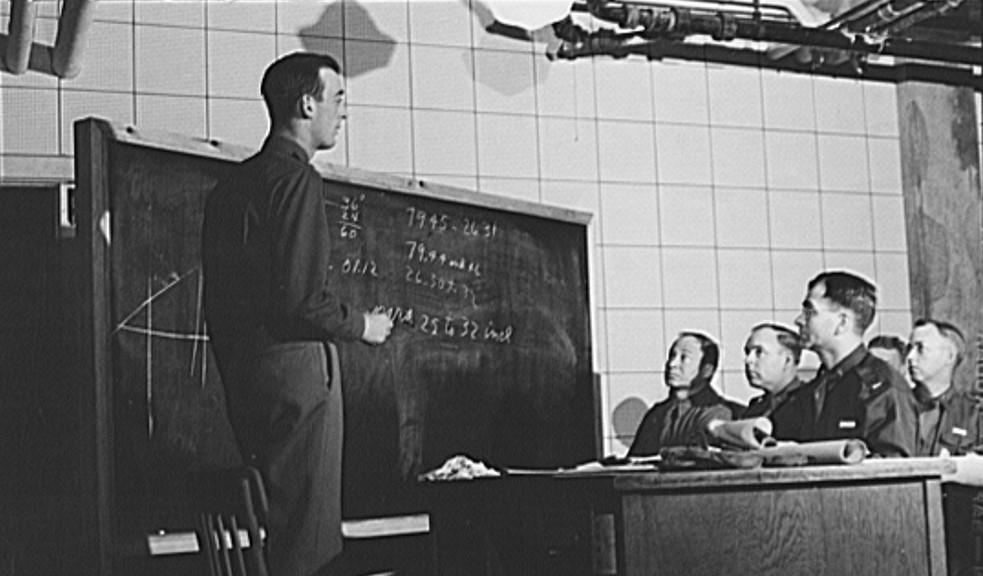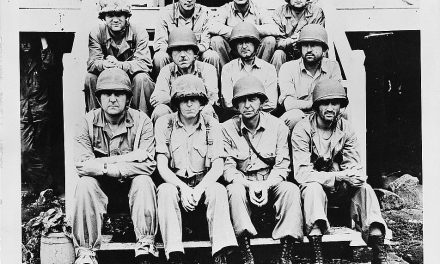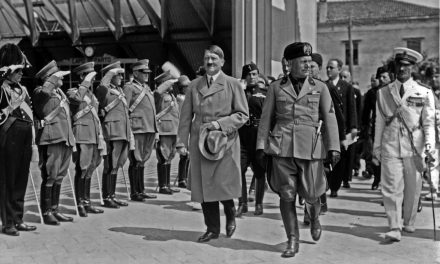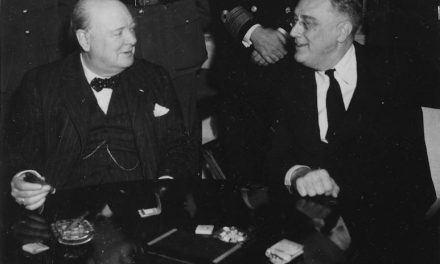With no end to the war in sight, it is easy to overlook aspects of life that do not seem to directly affect the war effort. Men as young as 18 are joining the troops overseas, putting off any plans for higher education until the war is over. Yet even the military understands the importance of schooling.
Professor John O. Neustadt of St. John’s College has been brought to Fort Meade, Md., to teach a class of 24 privates and officers about classic literature. First on the list: Homer’s “The Odyssey”—a tale about the Greek hero Odysseus traveling ten years home to Ithaca after defeating Troy in the Trojan War.
“The Odyssey,” said one of the privates, “is not history; it’s pure legend. The history of great battles can be told and retold until all fact is sacrificed for legend.”
With more prodding for detail from Professor Neustadt, another soldier explained, “The Odyssey is just Homer’s embellishment of Ulysses’ alibi to his wife for waiting so long to come home after Troy.”
The idea, sparked by St. John’s president Stringfellow Barr, is to introduce classic literature into education of the U.S. Army. “The Odyssey”—a required reading to many who sit through college courses on literature—was not just chosen to expand the minds of those in the Army. Homer’s epic tells of great battles and strategy that can be useful to one fighting a war. Professor Neustadt’s selections for the rest of the course include: Plato’s “Meno”; “Apology and Crito”; Thucydides’ “History of the Peloponnesian War” (books one, two and seven); “Hamlet”; “King Lear”; and “Gulliver’s Travels.”
Those unable to attend Professor Neustadt’s course on classic literature have other options to keep their minds sharp while defending their country. Troops across the globe have begun taking college courses by mail. From camps in Australia to India, American soldiers can be found studying up on mathematics and U.S. history. With their noses stuck in books, the troops are simultaneously getting an education and helping with the war.
For example, Corporal Stanley Chester, born and raised in New York, is managing a course in American history while stationed with a medical detachment in the Pacific—he has already completed 11 lessons with a grade consistently higher than 90.
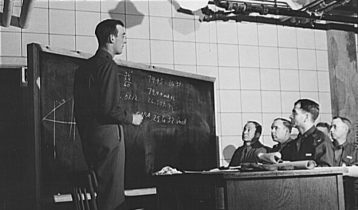
U.S. Army men in class at Fort Benjamin Harrison, Indiana. Photograph by Jack Delano. From Library of Congress.
Of course, a soldier’s duty always takes priority. A Sergeant Erikson said that one lesson about military history “was sort of held up because of a little of the real McCoy over here.” A high school graduate, Erikson had not imagined being able to complete college courses while serving.
The U.S. military’s education-by-mail program, headquartered in Madison, Wisc., offers 64r courses in numerous subjects. Every soldier, no matter the rank or branch, is eligible for the program. The courses cost $2 each, which covers the cost of books, papers, and other materials. Although the program will only succeed with the soldiers’ hard work, it is taken into account that having to fight in battles is a good excuse to hand in assignments late.
Along with these provided by the Army, the military has partnered with colleges to create another type of education-by-mail, which has increased the courses available. As many as 700 courses are listed, though the ones taken through the colleges cost up to $20. Fortunately, the Army agreed to pay half, cutting the cost for the soldiers trying to earn an education.
At this time, over 30,000 men have enrolled in this program, and the Army expects around 1,500 new candidates to enter each week. This means that a predicted 100,000 soldiers will be taking or have completed these courses by the end of the year.
While this program may seem hectic at first glance, it is supervised carefully. Soldiers participating meet monthly with an education advisory committee, which oversees the preparation and instruction of the courses. The committee is headed by Colonel Francis T. Spaulding, the former dean of the Harvard University Graduate School of Education.
A soldier who completed a course in economics explained, “This course was necessary for me to get my high school diploma. I think it has helped me directly as a soldier and will help me later too.”
It is unclear how these courses will transfer back to the colleges for credit once the war ends. New York University has declared its support for accepting these courses as valid transfer credits once soldiers return from war. It has also suggested that extra credits be given to those who return, based on the extensive military training they received while overseas.
Not only is education overseas an important aspect of life at war, so is the training and schooling before getting deployed. The military has been working hand-in-hand with colleges and universities to help those ready to get shipped out. At this time, about 400 colleges have agreed to the military training schedule, which not only strengthens young men for the physical aspects of the war, but prepares them intellectually as well. Some of these courses include engineering, aviation, training in navigation, learning the Japanese language, in automobile mechanics and other technological studies.
For those not directly involved in the fighting overseas, one might reach the point in his or her daily lives where the soldiers seem like nothing more than pawns in a bigger plan—the pieces placed forward just to win the war. After all, when looking at reports of Allied victories and defeats, why wouldn’t one think that? The information relayed back to the U.S. people is always that of the bigger picture . . . Are the Allies winning or losing the war?
However, the determination to educate these young men—before, during, and after the war—is a sign of how highly the military regards its soldiers. They are not just viewed as weapons to be used against the enemy. They are valued (for their bravery, strength, and heart), and U.S citizens know now that the military understands the importance of education.
Sources:
Fine, B. (1943, February 21). COLLEGE SPEEDS PLANS FOR ARMY-NAVY TRAINEES. New York Times, p. E7.
Fine, B. (1943, June 27). TROOPS ALL OVER WORLD TAKE COURSES BY MAIL. New York Times, p. E9.
Great Books at Camp. (1942, July 20). TIME, 40(3), 40.

